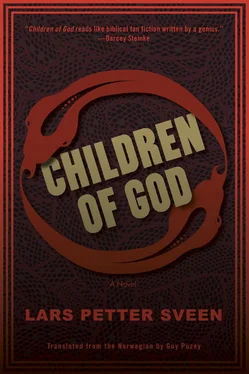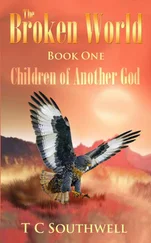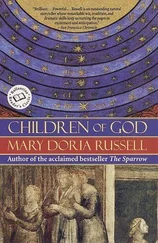Those memories of Ruth’s words and the times when Reuben sat next to her led her, blind with longing, into Andrew’s hands. And Andrew, Andrew, what was it about him? How did he find his way so close to her? Why did he never hurt her? Sometimes, when he was sleeping next to her with his eyes open, she sat up and talked to him. She whispered about why she was there, in Sychar, she whispered about her mother and father and what little she could remember. She told him about Ruth, who’d taken care of her and taught her everything she needed to know, but who’d gone. She asked if he’d stay there, with her, forever, at which Andrew moved and blinked before lying still again. She lay down close to his warm body. His hair-covered arms were like great wings.
The next morning, Andrew leaned over Anna and kissed her on the breasts, on the neck, on her closed eyes. His hand lingered on her torn ear.
“It looks like a shell washed ashore by the waves,” he said.
One day, when Andrew had gone too, Reuben came back, and she just stood there in her small room, trembling. She tried to pull herself together. She made him food and lay down next to him, but her trembling wouldn’t stop. She trembled all through the night, in the pitch darkness, with Reuben’s warm breath on her head. Only when he held her tightly in the soft morning light and pushed his way inside did her fingers, hands, and feet become still.
Those last days Anna and Reuben had together did her good. She didn’t scurry back and forth, dripping with sweat, cold, muttering, moaning. When Reuben came back, he found what she’d forgotten. He made her see that the world in which he sang, in which he caressed her, the world in which Andrew’s fingers, his mouth, soft hair, and gentle voice could be found, was a false world, and it had made her lose her mind. Underneath Reuben, she was pushed back inside herself and back into the real world.
When Reuben left her the second time, he took out a small purse of silver coins.
“This is for you and your foot,” he said. “I see you’ve still got a limp.”
Three men stood waiting outside. One of them had his face bound up in rags, while the second, tall and thin, stood facing the back alley that led to where she lived.
“Reuben,” the third man said, “it’s time to get going.” The man’s eyes looked gray and glowing, his hair cut close to the scalp.
“I’m coming,” said Reuben. He turned, but then Anna reached out to touch him.
“Have you seen Ruth anywhere?” she asked.
“She’s gone,” said Reuben, but Anna started to describe her big sister and what she looked like. He cut her off. “I know who Ruth is, I haven’t seen her. I’ve got to go now.”
“Will you come back?” Anna asked. Reuben looked down at her before putting his hands up to hold her face. He looked surprised, as if what he held were something he hadn’t seen before.
“I’ll return,” he said. “I promise you.”
She never saw Reuben again. Ruth’s words had been true. All the ones who came to them had lost their way. Anna made them feel found. But none of them stayed. Even Ruth had gone. A rumor went around that her elder sister had left with a man from Judea and his children. She’d dropped everything and left, but Anna wouldn’t blame her for it.
Anna would dream of Ruth, talking to her in her sleep. In the soft, blue world of dreams, Ruth told her about the children who called her their mother, about her husband who gave her gifts, and how they were truly blessed by the Lord God. She told Anna to visit them, that they had space for one more in their house. Her dear husband had a brother too, and maybe this handsome, gentle brother would ask Anna to marry him?
But everything dissolves in the light of day. Like the man Anna had now, Baasha, who came to her in the evening and vanished by morning. He didn’t beat her, but he pulled her hair and would only enter her from behind. He smelled of nothing, and sometimes when she woke up and he’d gone, she wondered whether he was human or just something evil that came alive in the dark of night.
This morning, while the world was still only lit by a faint light, and before Anna went up to the well and saw the black bird, she’d woken to Baasha standing there, staring at her.
“You’re dirty in the light,” he said, leaving her.
She got up immediately and shouted after him. Anna screamed and shouted, and Baasha ran away. She didn’t know what was wrong with her. She grabbed one of the jugs she had standing there and smashed it on the ground. The jug was a present from her second man, Aaron. He’d found it among the possessions of his late mother and wanted to give it to Anna as a gift. That was only a short time after Anna’s first man, Philip, had broken all his promises and left her.
Aaron kept on bringing her presents, and when she started to say no to the things he brought her, he stammered and told her she couldn’t say no. He told her he didn’t have any money of his own; this was all he could pay her with. Those words made her lunge at him and scratch his face. He ran off but came back that same evening and forced himself on her. He beat and kicked her so hard that she couldn’t walk for several days.
Ruth had found her, nursed her, and told her that wasn’t the way to act.
“You mustn’t let them see you like that,” her elder sister told her. “They get scared of how powerful you can be, how big you are. They’ll try to destroy you, make you small again.”
One of her ears had been battered. Anna always made sure to cover it up.
Like Aaron had come back at the end of the day, Anna knew that Baasha would come back that evening too. There was nothing to do but wait. First she was paralyzed with fear. The mark Reuben had left began to hurt. A soft rushing sound beat at her wounded ear. Darkness crept in and descended over Anna. She blinked, but it wouldn’t go away. It was like sand in her eyes. She opened her mouth, but her tongue was dry. There was something cold and raw inside her; a soft voice began to speak, a faint whisper about empires rising, empires falling, about the lowly ones in the dust, about people and grains of sand and the wind blowing it all away. Anna gasped for air; she couldn’t breathe. It was all over. Never again the morning, never again the day. No moon, no stars, only a haze that would drive her out of her mind if Baasha didn’t kill her first. It came to her that the few things she’d been able to call good had all gone. The people to whom she offered herself left her. And the people who left her kept her awake at night.
She knelt down to gather up the remains of the broken jug. The shards lying there were sharp and black. She held one in her hand and pressed it against the other hand, where her warm pulse was beating.
“God,” she said, “take me.”
But a great roar came up the alleyway, she could hear it, as if the ocean were coming, roaring up from the alleyway into her house. The door opened, and a force hit her chest with such power she was almost knocked over. She got up, staggered backward, dropped what she had in her hands, and slammed into the wall. She squeezed her eyes shut, and when she opened them again, the shards were lying on the ground, and the door was wide open. Everything was quiet.
Years later, Anna would speak about that peculiar incident, which at that very moment had something familiar about it, yet at the same time something impossible to comprehend: the morning light, Baasha running off, the dark haze, the broken jug, the roar, her trip to the well. Anna would recall how she’d been filled with a power so strong that nothing could threaten her or keep her down. A light, flashing in the dark, the flapping of a wing, who knows. The truth was that, right there and then, on the way to the well, carrying the tall, round, flat-bottomed jug, Anna had become somebody else. Her new life had begun with that roaring sound and the black bird. But in the years to follow, there was no bird, there were no men, there was no Baasha or Reuben or Andrew in her story. Even dear Ruth had gone. Anna’s story began with Anna’s own words about the roar she’d heard. And Anna’s words tell of when she met Jesus at the well.
Читать дальше











